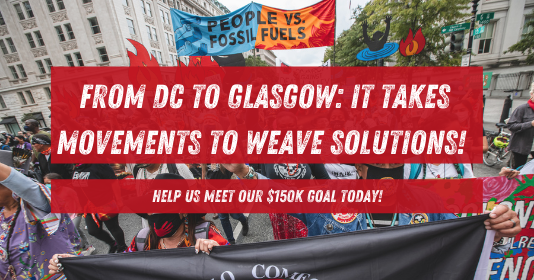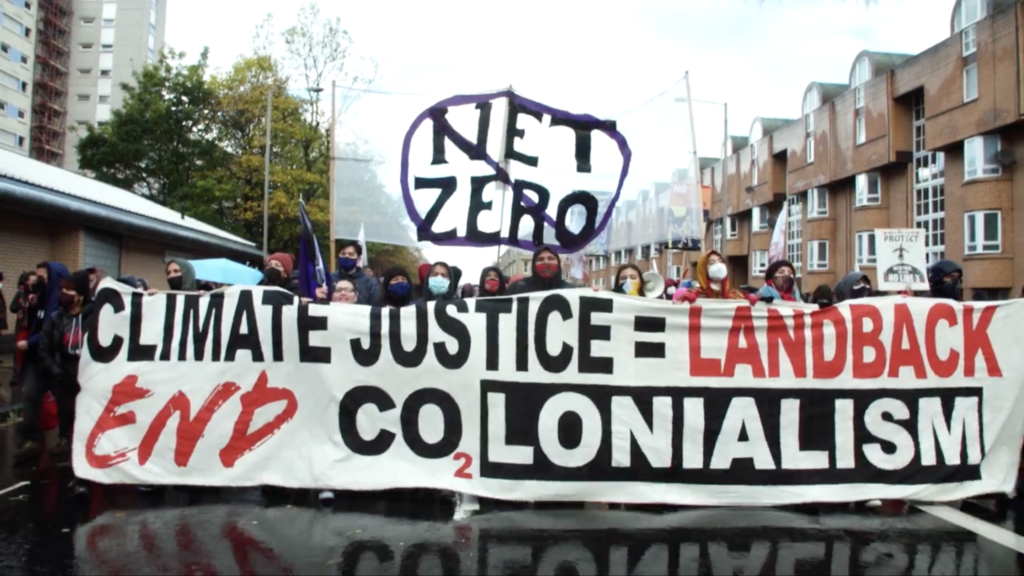
This past summer, amidst relentless heat waves and hurricanes, violence against Haitian climate refugees at the border, and repression of water and land protectors, Congress debated an over $700 billion annual budget for the U.S. military—one of the world’s largest polluters. Meanwhile, a $350 billion annual recovery package was negotiated down as conservatives on both sides of the aisle put investments for our communities—for care, for environmental justice, for housing—on the chopping block.
At GGJ, we know that folks on the frontlines of the climate crisis and other structural injustices have the wisdom and experience to make connections between issues, and weave people and planet-centered solutions with urgency. That’s why we’re not only cohering the Left through convergence, political education, and campaigns, we are also bringing together frontline leaders in a campaign to win bold policy solutions.
Earlier this year, we joined organizations in the Green New Deal Network (GNDN) to organize leadership of grassroots groups fighting for climate, racial and economic justice and an end to war and militarism, to influence the economic recovery package negotiations. Our long-term vision is to achieve a Just Transition to a Feminist, Anti-Racist, Regenerative Economy (FAREconomy), and a Green New Deal (GND) presents an opportunity for us to advance even more transformative solutions across multiple sectors towards that vision:
Climate and Care

Care workers, the backbone of our society, are not only seriously affected when climate crisis strikes, but are first responders who care for our most vulnerable. Unfortunately, this work— held by those who are oppressed due to gender, race, class, and immigration status— remains invisibilized and under-valued. In July, GGJ convened a delegation of care workers impacted by climate change from Florida and California including Miami Workers Center, Women Working Together, and Mujeres Unidas y Activas, for the #CareisEssential action in DC. We joined SEIU, National Domestic Workers Alliance and others to demand that Congress pass a budget investing in care workers and climate action. GGJ led political education sessions with the delegation, in which members strategized how to organize local GND efforts, and asserted their voices as care workers in this critical national conversation.
Demilitarization and Decarbonization

A Just Transition requires divesting from the old extractive economy, and reinvesting in the new and regenerative future. This means ending fossil fuel extraction projects and dismantling the pollution-generating war machine so that we can invest in clean energy, infrastructure, care work, education, housing, and other community necessities. As you read this, 26th Conference of Parties (COP26) of the United Nations Framework Convention on Climate Change (UNFCCC) in Glasgow is wrapping up. We convened a powerful delegation that included our demilitaRISE member-leaders who called attention to how the military causes pollution and how extractive industries leverage militarization to deploy their polluting projects. Groups like SouthWest Organizing Project and Micronesia Climate Change Alliance highlighted the impacts of toxic military waste and climate crisis on their communities.
GGJ also recently sent a delegation to DC for the Indigenous-led People vs. Fossil Fuels week of action, calling out Biden’s hypocrisy in pledging to cut greenhouse gas emissions while continuing to invest in fossil fuel extraction, and demanding a declaration of national climate emergency.
Our contributions and resistance are not only necessary, they are a matter of urgency!
As GGJ’s new Policy Director, I’m seeing first-hand the power of engaging in these interconnected fights. We have a political vision to bring to life that will take the work and support of every last one of us along the way. As we step into this moment and prepare to build power in new ways, can we count on you to join us? Our goal is to raise $150k in this campaign. A gift of any amount will support bringing the frontlines to political and policy fights and strengthen our work of weaving intersectional solutions.
Onwards,
Adrien Salazar
Policy Director, Grassroots Global Justice Alliance (GGJ)
